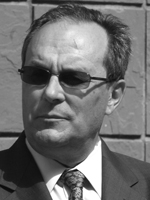
Dr. Alexander S. Raikhel earned his M.S. from St. Petersburg State University in Russia and was awarded his Ph.D. from the Zoological Institute of the Russian Academy of Sciences, also in St. Petersburg. He immigrated to the United States where he re-established his career in entomology, first at the University of Georgia in Athens, then at Michigan State University, and, since 2002, at the University of California, Riverside.
At Athens with Arden Lea, Alex commenced his studies into vitellogenesis in the mosquito Aedes aegypti. These early ultrastructural and immunocytochemical studies led directly to the purification and analysis of the many proteins involved in this important reproductive process, and to an understanding of the regulatory linkages between vitellogenesis and juvenile hormone. Within nine years of commencing this work, Alex succeeded in cloning and characterizing the first of many genes involved in vitellogenesis, work which has continued to this day.
In recent years Alex has tackled, at multiple levels, the equally complicated task of dissecting the molecular basis of the immune response in A. aegypti and has, as is the case for his vitellogenesis research, established leadership in it. Alex’s research has established a critical physiological and molecular linkage between the need for a female mosquito to imbibe blood and the ability of blood-borne pathogens to subsequently evade her immune response.
What has distinguished Alex’s research in both systems has been his meticulous approach to experimental design and analysis, and his embracement and advocacy of new and incisive genetic and biochemical tools. His logical, thorough, and analytical approach to experimentation has tremendously advanced our knowledge of critical genetic, biochemical, and physiological systems in mosquitoes, which will serve as a foundation for the sustainable control of mosquito-borne disease.
Alex has served as co-editor of Insect Biochemistry and Molecular Biology, and he helped establish this as one of the major journals in the field. He established the Center for Disease Vector Research at the University of California, Riverside, and successfully recruited new faculty to it. He continues to develop new courses in vector biology which emphasize state-of-the-art techniques, and he has graduated many students who now contribute, through their own laboratories, to molecular insect science.
Alex received ESA’s Recognition Award in Insect Physiology, Biochemistry, & Toxicology in 2001. He is an AAAS Fellow, and in 2009 he was elected to the U.S. National Academy of Sciences in recognition of his pioneering research in mosquito physiology and molecular biology.
(updated August, 2009)
